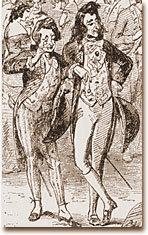
Exxon Mobile has reported quarterly profits 36% higher than this time last year. This report coincides with all-time record high gas prices across the country, which the oil companies blame on high oil prices. Now, I am as capitalist a pig as the next guy, but I have some problems with this.
Increased profits of this magnitude cannot be adequately explained by increased sales alone. I believe (and this is just my opinion) that the oil companies are raising their gas prices far more than the increase in oil prices warrant. As the price of oil rises, the oil companies are also expanding their profit margins. It is, of course, good business practice to charge what the market will bear. The oil company shareholders are no doubt thrilled with the dividend checks they are receiving, and the executives are doing a fine job enhancing shareholder value.
Here is the problem: As gas prices rise, so too do the prices of everything else. I'm no socialist, but when the price of a single product or commodity has such a far-reaching impact on the entire economy, it makes me pause. Gasoline appears to have moved from being just another product for consumers to consume, to something more.
Electricity, natural gas, telephone service, all are considered to be utilities. They are recognized as essential, necessary services that our civilization relies upon heavily. Due to this fact, they are regulated by the government to ensure that they don't price-gouge their customers. The price of these utilities directly affects the price of everything else and loss of these utilities, even briefly, can have enormous economic consequences. So I ask, how is the gasoline supply any different?
Gasoline has the same importance and impact on our society as any utility. But the price of gasoline is free from any regulation which might reasonably be applied to electricity, etc. Can the public interest be entrusted to corporations whose only goal is to make the most money possible?
I know that history has shown that government price regulation doesn't work, and attempts to do so invariably fail due to a lack of agility on the part of said regulations to adapt to changing market and economic conditions. The most glaring example is California's price cap on consumer costs which was imposed on electricity providers a few years back. As wholesale energy prices went up, the utilities were powerless to pass the increases on to their customers, resulting in mounting debt and potential insolvency of the electric utilities, rolling blackouts statewide, and ultimately the downfall of governor Gray Davis (and the ascendancy of Ahhnold).
The California mess is an example of an ill-conceived attempt to control prices and the unintended consequences thereof. Prices cannot be artificially set in a market economy, but what about profit margin? Isn't that the basis of utility price regulation? And why can't profit margin control be applied to some extent on oil companies? Some might argue that such controls would stifle exploration and development of additional refining capacity, which this country desperately needs. My response would be that huge dividends paid to shareholders aren't doing much to develop resources or increase capacity either.
So what am I missing here? Isn't it inherently perilous to leave the complete control of a strategically critical resource entirely in the hands of the executives of multi-national conglomerations whose sole interest is enhancing shareholder value and earning multi-hundred-million dollar bonuses? Should there be some kind of control on the exorbitant profit margins that come at the expense of everything else? I don't want to redistribute wealth here, I just want to get Exxon Mobile's pump nozzle out of my pipeline, if you get my drift.





